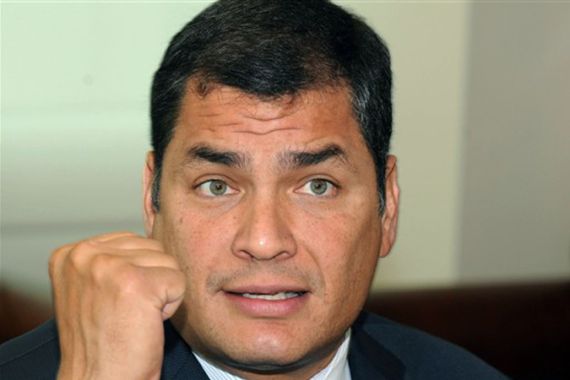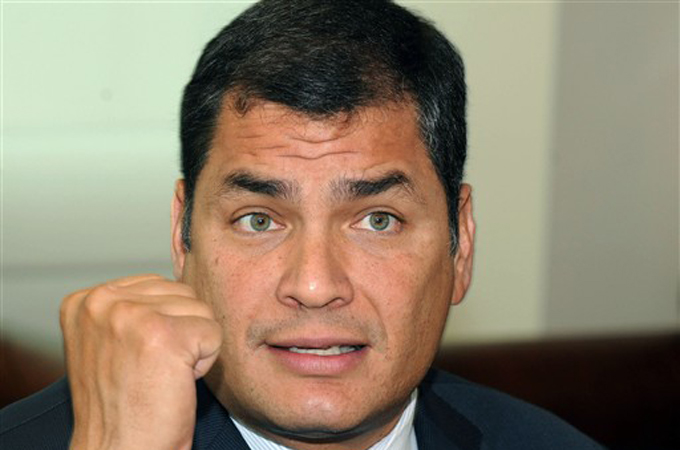Profile: Rafael Correa
The left-leaning president of Ecuador is broadly popular and has won several political battles.

 |
| Correa used his economic expertise to improve Ecuador’s economy [AFP] |
Rafael Correa, Ecuador’s president, has put his country’s social policies and debt burden at the centre of his presidency since he was elected in 2006.
Correa, who counts Venezuelan President Hugo Chavez as a close friend, is known for being unapologetically outspoken. He called former US president George Bush “a dimwit” and accused his own country’s media of behaving like “wild beasts.”
And following the recent unrest in the Ecuadorian capital city of Quito, he stood before a crowd, opened his shirt and challenged: “If you want to kill the president, here he is. Kill him, if you are unhappy, kill him if you are brave enough.”
The left-leaning Correa, who was Ecuador’s finance minister prior to becoming its president, considers dependence on foreign credit as the main obstacle to the country’s development, and despite having a contentious relationship with the Ecuadorian press, he is generally seen as a populist leader.
“He is broadly popular, he has won elections consistently, he has won political battles consistently, he has broad popular support,” Marc Chernick of the Centre for Latin American Studies at Georgetown University told Al Jazeera.
“He has really taken over from what he describes as a corrupt political class and he is trying to remake the system. That position has been broadly popular.”
Correa considers his country’s national debt as illegitimate because those loans were taken by previous regimes he considers corrupt. He vowed to fight creditors in international courts and managed to reduce Ecuador’s debt letters.
His administration has pitted Ecuador against the International Monetary Fund (IMF) and the World Bank, blaming their policies for Ecuador’s economic problems. Indeed, Correa halted payments on debts he said were “illegal” while working to increase state revenue through renegotiating contracts with oil companies.
Correa backed constitutional reforms geared to tilting the balance of power toward the executive. He was re-elected with 55 per cent of the votes under the new constitution in 2009, and is allowed to stand again in 2013. His critics have cited Correa’s support of a constitutional rewrite that allows for two consecutive four-year presidential runs as proof that he is trying to amass too much power, a claim Correa, a self-described left-wing Christian, denies.
Born in 1963, Correa has a political, though far from privileged, lineage. While his maternal grandfather was a great-nephew of former president José Eloy Alfaro Delgado, his father served several years in jail after he was arrested trying to smuggle drugs aboard a flight to the US. Reuters reported that Correa, who was five years old at the time, spoke about his father’s arrest in 2007.
“I am not to blame for what my father did 40 years ago,” said Correa, who was accused by his opponents of benefiting from his father’s criminal activities. “I do not justify what he did, but he was unemployed.”
Having earned a scholarship to the prestigious San José La Salle high school before going on to study economics in American and Belgian universities, Correa, supported by his mother, used his own story to draw attention to how poverty affects families.
“I lived through this and these people are not delinquents. They are single mothers or unemployed people who are desperate to feed their families,” said Correa, who also spent a year as a church-sponsored volunteer with Quechua-speaking Indians in Cotopaxi province, allowing him to communicate directly with the country’s indigenous population.
While Correa is often lauded by Ecuadorians – roughly 35 per cent of who live below the country’s poverty line – for increasing national spending on social programmes, a new budget that would cut bonuses for armed forces and police, has won him the wrath of the country’s police and army.
The proposed bonus cuts lead to riots and protests, resulting in minor injuries to Correa himself, who was attacked by soldiers and police forces.